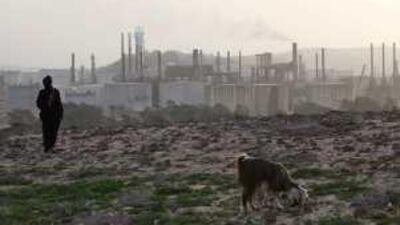AMMAN // The arrest last week of four prominent Jordanians, including a former government minister, in the first ever high-profile corruption case involving a publicly traded company took many Jordanians by surprise.
A military tribunal is currently investigating the case, which involves the selection of a strategic partner for a $2.1 billion (Dh7.7bn) expansion project at the Jordan Petroleum Refinery Company (JPRC), the country's sole refinery. Adel Qudah, a former finance minister and a former JPRC chairman, former JPRC director general Ahmad Rifai, the prime minister's economic adviser, Mohammad Rawashdeh, and businessman Khaled Shaheen were all detained last week. They are being held in an Amman prison on charges of bribery and misuse of public office. Their assets have been frozen.
A court of first instance allowed the four to be released on bail last week, but in a rare development, Samir Rifai, the prime minister, referred the case to a military court because it "falls under the domain of economic security". The military court overturned the ruling on bail and the four are still detained. Ahmad Najdawi, Mr Qudah's lawyer, told Reuters, "In my memory, there has not been this level of injustice levelled against a former official by such sweeping freeze of assets of him and his close relatives."
"The case involves a public and a vital sector, which is energy," said the minister of state for media affairs and communications, Nabil Sharif. When Mr Rifai took office last December, he launched an offensive against corruption and a handful of low-level cases were referred to the Anti Corruption Commission over the past two months in a sign that the government was living up to its word. However, Ghassan Muamar, a lawyer who specialises in corporate and international law, said: "This case is unprecedented. The prevalent impression is that officials are immune. What is needed now from the government is to have an institutionalised methodology in fighting corruption, one that would support the government's campaign.
"We need accountability in the system. We have a strong judicial system but it needs to be an administratively independent body to ensure that it maintains its impartiality and that it would not succumb to any influence." In the past few months, rumours of corruption at the refinery spread as local papers questioned the tendering process. Corruption cases involving public officials are extremely rare in Jordan.
The last one involving a high-level official was in 2006 when Abdul Razzak Tbeishat, a former minister of municipalities was implicated for allowing the purchase of what turned out to be faulty waste-management machinery from Germany at an estimated cost of US$6.3 million. A parliamentary committee investigating the case found Mr Tbeishat innocent two years ago. In 2003, a former head of intelligence, Samih Batikhi, was sentenced to four years in prison for fraud and embezzlement.
"Normally this kind of news might fly under the radar with the expectation that those detained will likely be low-level employees, but upon reading the names, you're forced to pause and make sure you read that right," Naseem Tarawneh, a well known Jordanian blogger, wrote about the arrests. "Obviously, the real test lies in what happens next. But whether this unfolds into an actual trial, it will be a sight to see. The Jordanian equivalent of putting Al Capone on trial."
The government's handling of the case, however, has it critics. "The government has announced the names, and scandalised them before they are tried, and it left to the street to pass its judgment on those arrested. This hastiness is not acceptable," wrote Jawwad Anani, a former minister and a commentator with the daily Alghad this week. @Email:foreign.desk@thenaional.ae

